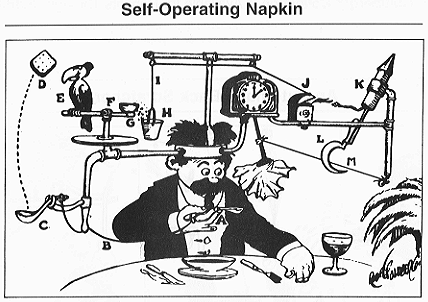”Professor Butts and the Self-Operating Napkin” (1931), by Rube Goldberg.
A bunch of physicians writing in STAT have denounced the vastly complicated U.S. healthcare “system,” if you want to call it that.
They note the competing and contradictory roles of ”interrelated insurers; medical and specialty societies, state medical boards, and medical examiners; medical schools, academic medical centers, and graduate medical education programs; along with a multitude of corporate players and constituents like the biotech, pharmaceutical, medical device, and health information technology sectors. Caught in this web are some 900,000 practicing physicians, as well as millions of other healthcare workers and the populations they serve.”
“The complexity of this system leads to what we consider to be an epidemic of burnout in today’s medical profession.”
“There’s no question that it’s easier to hypothesize, survey colleagues, and write opinion pieces than it is to disrupt and transform the complex U.S. healthcare system. But let’s recognize that a key contributor to this complexity is a clunky and time-consuming electronic health record infrastructure that is taking an enormous toll on the well-being of physicians and the vitality of medical practice. Patients are well aware that computers are diverting their doctors’ attention from the human, interpersonal dimension of the care experience, and this may contribute to a variety of undesirable and unintended outcomes.
“The remedies won’t be easy to accomplish. But one place to start would be for the next Bill Gates or Steve Jobs to create a compelling, user-friendly health care electronic health record (EHR) platform that delights physicians and patients alike.”
Given the power and money behind the various healthcare economic interest groups, including physicians, it’s hard to see the U.S. “system” getting simpler anytime soon, and certainly not under the Trump administration.
To read the article, please hit this link.
“Politics: A strife of interests masquerading as a contest of principles. The conduct of public affairs for private advantage.”
— Ambrose Bierce




